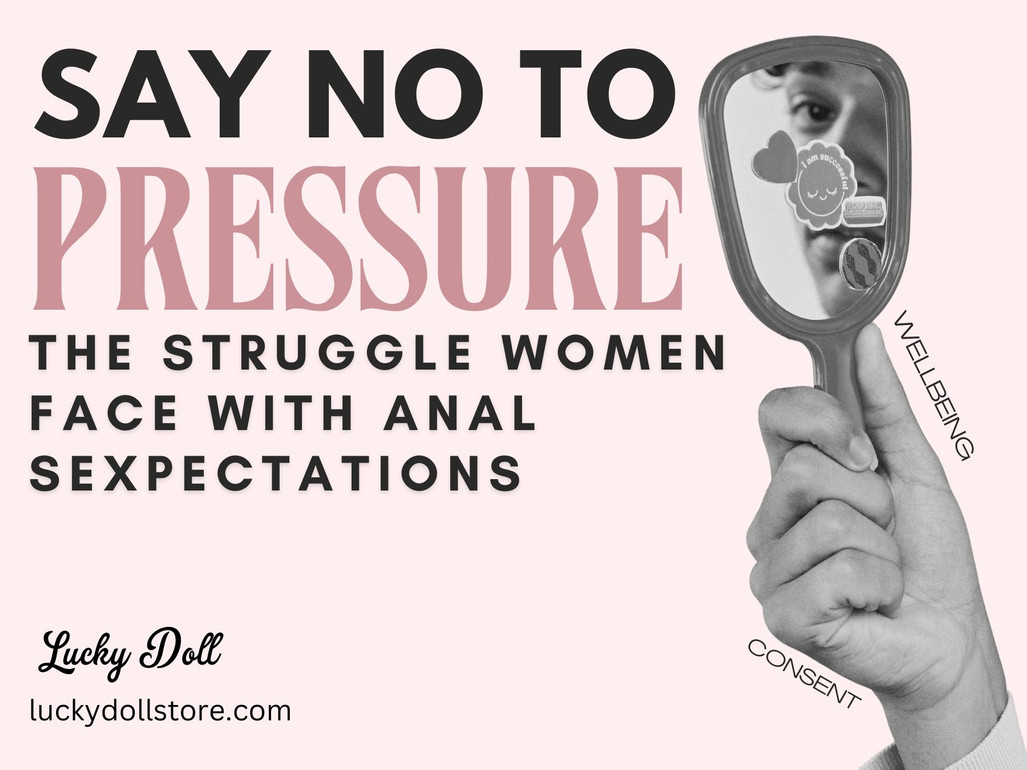Posted by Lulu Hellcat on 20th Jun 2024
SAY NO TO PRESSURE: The Struggle Women Face with Sexpectations
This is not your typical "how-to" guide that you often find in fashion or men's magazines. Those articles tend to normalize sex as a standard expectation in relationships, offering tips and tricks on how to please your partner. Instead, this article aims to empower women by providing guidance on navigating the pressures they may face regarding anal sex. It's important to note that this is not about shaming those who enjoy anal sex; everyone has their own preferences. However, this is a guide to understanding consent and personal boundaries—something often missing amidst the plethora of articles focused on "Top 10 Ways to Please Him" or "Secrets to Making Him Want You More." Far too few articles address what WOMEN want—or don't want.
As I am double-checking our website's SEO and ensuring our product pages are informative, I noticed a crucial information that's missing on our Anal product pages—a disclaimer specifically for women. As a business committed to empowering women, it's clear we need to rectify this oversight. Our goal isn't just to sell products but to create a safe space where women feel empowered and respected.
Reflecting on this, we've taken immediate action by adding disclaimers to our Anal Sex enhancing products. Beyond that, we felt compelled to delve deeper into the topic by creating this blog entry. In researching existing articles on the subject, I discovered a gap: while many discuss how to enjoy anal sex, few address the unspoken pressures women often face in this area.
Understanding the Pressure

Many women report feeling pressured to try anal sex by their partners, who may present it as a token of love or an essential milestone in their sexual relationship. This pressure can manifest in various ways, often starting subtly. For instance, a partner might frame anal sex as a “gift” for special occasions like Valentine’s Day, birthdays, or anniversaries. This presentation can make it seem like an expected part of a romantic celebration, implying that it’s a normal or necessary component of showing love and affection.
Moreover, partners might use emotional manipulation to persuade women into agreeing. They might suggest that refusing to engage in anal sex indicates a lack of love, commitment, or adventurousness. Comments like, “If you loved me, you would do this for me,” or, “Why are you so uptight? Everyone does it,” are common examples of such manipulation. This kind of coercion can be incredibly damaging, leading women to feel guilty or inadequate if they do not comply.
The societal and cultural context also plays a significant role. Media, including movies, TV shows, and especially adult entertainment, often normalize anal sex, portraying it as a standard part of a healthy sexual relationship. This normalization can add to the pressure, making women feel like they are missing out on an essential experience or failing to fulfill their partner’s desires if they choose not to participate.
This pressure is not only unfair but can also lead to significant emotional distress. Women may feel conflicted, torn between their own discomfort and the desire to please their partner. This internal conflict can erode one’s sense of autonomy, making it difficult to assert personal boundaries. Over time, succumbing to such pressures can negatively impact a woman’s self-esteem and sense of sexual empowerment.
Furthermore, being coerced into unwanted sexual activities can have long-term psychological effects. It can lead to feelings of resentment, anxiety, and even trauma. It’s crucial to recognize that consent must be enthusiastic and voluntary; anything less is a violation of one’s personal agency and well-being.
Ultimately, the pressure to engage in anal sex should be understood as a broader issue of respect and communication in relationships. A healthy relationship should prioritize mutual consent and respect for each other’s boundaries. By addressing and resisting such pressures, women can reclaim their autonomy and ensure that their sexual experiences are safe, consensual, and enjoyable.
Empowerment Through Consent

True sexual empowerment stems from the ability to make informed and voluntary decisions about one’s own body. It means having the autonomy to choose what you are comfortable with and what you are not, without feeling pressured or coerced by anyone else, including a partner. This is especially important when it comes to intimate acts such as anal sex, which can be particularly sensitive and require mutual consent and understanding.
If you are uncomfortable with the idea of anal sex, it’s crucial to assert your boundaries clearly and confidently. You do not need to “try it just once” to know if it’s not for you. The notion that you must experiment to validate your feelings is a myth that undermines your personal agency. Knowing your limits and standing by them is a key aspect of self-respect and empowerment.
Remember, consent is a continuous process. Just because you consented to something once doesn’t mean you are obligated to do it again. Consent can be given, withdrawn, and renegotiated at any point. This means you have the right to change your mind at any time, regardless of the circumstances or previous agreements. A loving partner will understand and respect this dynamic, valuing your comfort and emotional well-being over their desires.
In a healthy relationship, both partners should feel safe to express their boundaries without fear of retribution or guilt. If a partner pressures you into activities that make you uncomfortable, it’s a sign of disrespect and a disregard for your autonomy. True love and respect involve prioritizing each other’s comfort and boundaries. A caring partner will not subject you to physical pain or discomfort and will instead support your decisions and help you feel empowered in your choices.
Guidelines for Navigating Pressure
- Self-Awareness: Understand your own limits and preferences. Take the time to reflect on what you are comfortable with and what you are not.
- Open Communication: Have an honest conversation with your partner about your feelings and boundaries. Explain your discomfort and the reasons behind it. Effective communication is key to mutual understanding.
- Educate Yourself: Learn about the potential risks and necessary precautions associated with anal sex. Knowledge empowers you to make informed decisions.
- Seek Support: If you feel pressured, consider talking to a trusted friend, family member, or counselor. External perspectives can provide validation and support.
- Prioritize Your Wellbeing: Your mental and physical health should always come first. If a partner is unwilling to respect your boundaries, it may be a sign to reevaluate the relationship.
Empowerment through consent is about taking control of your body and your choices. It’s about understanding that you have the right to set and maintain your boundaries, and that these boundaries should be respected at all times. By prioritizing your comfort and well-being, educating yourself, and communicating openly, you can navigate pressures with confidence and ensure that your sexual experiences are safe, consensual, and enjoyable. Remember, your body and your choices are yours alone, and true love and respect from a partner will always honor that.
Sex, Love & Respect

A crucial point to remember is that a man who truly loves you and cares for you will not subject you to physical pain or discomfort. Love and respect in a relationship mean prioritizing your partner's comfort and boundaries. If your partner is unwilling to respect your limits and pressures you into something that causes you distress, it’s a red flag indicating a lack of respect and consideration for your well-being.
An important aspect of a healthy and respectful relationship is the understanding that physical and emotional well-being should never be compromised for the sake of pleasing a partner or conforming to societal expectations. When it comes to intimate activities like anal sex, this principle becomes particularly significant.
If your partner genuinely loves and cares for you, they will prioritize your comfort and respect your boundaries at all times. This means they will never pressure you into engaging in activities that cause you physical pain or discomfort, including anal sex. Love in a relationship should be nurturing and supportive, with both partners ensuring that their actions enhance each other's well-being.

Respect plays a pivotal role in this context. Your partner's willingness to listen to your concerns, understand your limits, and refrain from pressuring you into unwanted activities demonstrates their respect for your autonomy. Conversely, if your partner disregards your feelings or attempts to coerce you into something that causes distress, it's a clear indication of a lack of respect and consideration for your well-being.
It's important to recognize such behaviors as red flags in a relationship. Coercion or manipulation under the guise of love or affection is not acceptable and can lead to emotional turmoil and resentment. A healthy relationship thrives on mutual trust, communication, and the mutual understanding of each other's boundaries.
Ultimately, your body belongs to you, and you have the right to decide what feels comfortable and safe for you. A loving partner will honor and support your decisions, fostering an environment where open communication and mutual respect allow both parties to feel valued and secure in their intimacy. This mutual respect is fundamental to building a strong and fulfilling relationship based on trust and genuine care for each other's well-being.
Addressing Societal Pressures and Shaming

Unfortunately, societal attitudes often exacerbate the pressure women face regarding anal sex. Cultural narratives and media portrayals frequently depict anal sex as a norm in intimate relationships, suggesting that it’s an expected part of a fulfilling sexual experience. These representations can make women who choose not to engage in anal sex feel abnormal or deficient.
Women who decline to participate in anal sex may be labeled as "prudes" or made to feel inadequate. This shaming can come from various sources—partners, friends, or even broader societal influences. Such labeling is not only unfair but also harmful, as it undermines a woman’s confidence in her sexual choices and fosters a sense of inadequacy or guilt for not conforming to these perceived norms.
It's essential to resist these harmful stereotypes and understand that sexual preferences are deeply personal. There is no “right” way to be sexual; everyone has different comfort levels and boundaries. What is pleasurable and fulfilling for one person might not be the same for another. Sexuality is diverse, and respecting this diversity is crucial for fostering a healthy, inclusive society.
To combat societal pressures and shaming, it’s important to:
- Promote Open Dialogue: Encourage conversations about sexual preferences and boundaries without judgment. Open dialogue helps normalize the diversity of sexual experiences and preferences.
- Challenge Stereotypes: Actively challenge and reject stereotypes that label women who do not engage in certain sexual activities as "prudes" or "boring." These stereotypes are reductive and ignore the complexity of individual sexual identities.
- Educate and Empower: Educate yourself and others about the importance of consent and personal boundaries in sexual relationships. Empower women to make choices based on their comfort and desires, not societal expectations.
- Support Networks: Build and rely on support networks—friends, family, or online communities—that respect and affirm your choices. These networks can provide validation and strength in the face of societal pressures.
- Media Literacy: Develop a critical understanding of how media representations shape perceptions of sexuality. Recognize that media often portrays a narrow and unrealistic view of sexual relationships that do not necessarily reflect real-life diversity and complexity.
It’s crucial to create an environment where all sexual choices are respected, as long as they are consensual. This respect includes acknowledging that some women may not find anal sex appealing or comfortable, and that is entirely valid. Their preferences do not make them less adventurous or loving; they are simply exercising their right to choose what is best for their bodies and minds.
By resisting societal pressures and shaming, we can help foster a culture where everyone feels empowered to make their own sexual choices without fear of judgment or coercion. In this way, we support a more inclusive and respectful understanding of sexuality, one that values personal agency and consent above all else.
Conclusion: Empowerment and Autonomy
Navigating the complexities of sexual relationships, especially when faced with societal pressures and partner expectations, can be challenging. However, true empowerment and autonomy in sexual experiences come from knowing and assertively communicating your boundaries.
Anal sex, like any other sexual act, should always be a mutually consensual experience. This means both partners willingly agree to engage without any form of coercion or pressure. Your comfort, physical safety, and emotional well-being should never be compromised for the sake of pleasing someone else or conforming to perceived norms.
Prioritizing your comfort and well-being is paramount. It involves being aware of your own desires, limits, and boundaries. It's essential to educate yourself about the risks, benefits, and potential precautions associated with anal sex so that you can make informed decisions based on accurate information rather than societal myths or pressure.
Communication plays a pivotal role in navigating these pressures. Open and honest dialogue with your partner about your feelings, concerns, and boundaries fosters mutual understanding and respect. A loving and respectful partner will listen to your needs and preferences without judgment, and they will prioritize your comfort and consent above all else.
Remember, your body belongs to you, and you have the right to decide what feels right and comfortable for you. Your choices in sexual matters are valid and deserving of respect, regardless of societal expectations or pressures. A partner who truly loves and respects you will honor and support your decisions, even if they differ from their own desires.
In conclusion, empowerment in sexual relationships comes from asserting your autonomy, understanding your boundaries, and advocating for your own well-being. By prioritizing your comfort, educating yourself, and fostering open communication, you can confidently navigate societal pressures and partner expectations. Your body, your choices, and your voice matter—they define your journey to empowerment and fulfillment in intimate relationships.








